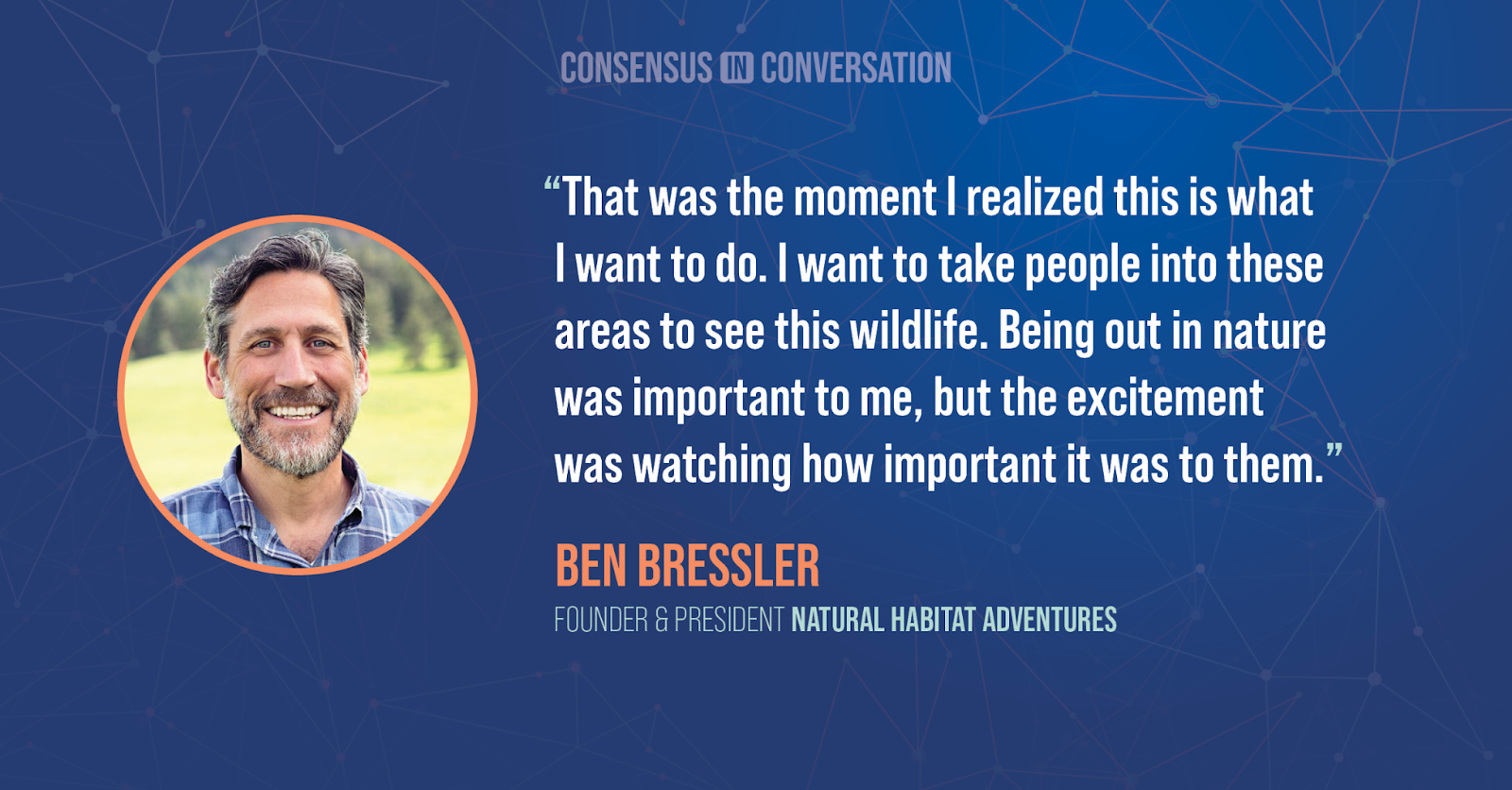
Headlines inundate us with stories of the massive CO2 emissions in the aviation industry and wildlife disturbances from increased crowds of tourists. So, how could travel have the potential to become a weapon in the fight against climate change? On its surface, the implication may seem ridiculous. Travel issues are real. However, not every vacation is as destructive as a trip to a White Lotus resort. Rather, well-designed ecotourism allows travelers to act as an additive force in the places they visit. And now, even the mainstream industry leaders are rethinking their models and starting to invest in more sustainable solutions.
We discussed the power and potential of the travel industry to do good with Ben Bressler on an exciting Consensus in Conversation (CiC) episode. Ben founded Natural Habitat Adventures, which offers unparalleled ecotourism experiences. Known as “Nat Hab,” the company helps guests visit Earth’s most wild natural areas in a way that is safe for the flora, fauna, and tourists. Ben’s unlikely rise from a school trip organizer to a travel industry vanguard with operations on every continent is fascinating, and his commentary on ecotourism’s ability to positively impact the world has profound implications.
By wholeheartedly embracing sustainability and conservation, Nat Hab has influenced stakeholders across the travel industry to reconsider their practices and to begin creating a new type of tourism that merges traditional business focuses like profitability and experience quality with new priorities like community impact and sustainability. Here are a few takeaways about how Ben is leading Nat Hab into a more conscientious future while garnering support from his competitors, local communities, and guests:
1. Competition Raises The Bar For Sustainable Travel. In our article about Cherry Street Energy, we discussed how sustainability is becoming a beneficial differentiator for businesses, and this trend is especially applicable to the travel industry. Tourists are now more conscious of their carbon footprint, giving companies that prioritize the environment a competitive advantage in the market. Ben Bressler witnessed this preference shift firsthand over his decades-long career in ecotourism. During our conversation, he explained, “Whereas 20 years ago it was consumptive bus tours, now [travel is] shifting towards smaller groups […] that are more purposeful in how they have a positive impact on the places they visit.”
The data support Ben’s observation. A study conducted by Expedia found that over half of all travelers would be willing to pay more for a sustainable experience. And this number increases to 70% if convenience is lowered instead of cost-effectiveness. Many travelers have elevated environmental impact to the same priority level as any other consideration when vacationing. But imagine if a travel company could judiciously balance sustainability, cost, and experience quality. Their market share would skyrocket, causing other organizations to follow their profitable example.
Nat Hab showcases the success earned when all three factors are aligned. Beyond offering a luxury experience at a competitive price point, Ben invested in sustainability earlier than most of his competitors. Nat Hab was the first company within their industry to reach carbon neutrality in 2007 – YES, 2007! More recently, they designed an electric safari truck and piloted zero-waste trips. These climate-conscious measures have won Nat Hab a vast amount of support among travelers, and the rest of the tourism sector has taken notice. The entire industry now recognizes the growing importance of sustainability in achieving profitability. More than 300 travel brands signed the UN’s Glasgow Declaration for Climate Action in Tourism, which commits each signatory to the new goal of reducing emissions by 50% before achieving net zero no later than 2050. The major travel publications regularly celebrate the most eco-friendly and sustainable businesses, and the big domestic airlines offer customers the opportunity to offset a flight. None of this was thinkable when Ben began Nat Hab, and most of this seemed impossible in 2007 when Nat Hab reached net zero. But, Nat Hab’s role as a pioneer has inspired other companies to reduce their environmental impact to better appeal to their customers. Ben is confident that every player in the industry will continue to challenge each other for the distinction of achieving the highest environmental standards (This is our favorite iteration of a virtuous cycle!).
2. Ecotourism Quantifies Nature’s Value. Economic factors often drive environmentally extractive practices in many regions. Logging, hunting, and mining are critical to the local economy and, thus, the average citizen’s livelihood. None of these enterprises are reprehensible, but a complex web of factors has led to the overharvesting of resources. While this practice may generate immediate profits, we now see how it destroys natural areas and their ecosystem services, generating trillions of dollars each year. The term “ecosystem services” refers to any benefit that the environment bestows upon humanity. Some important examples include a wetland’s function as a water purification system or a forest’s role as a carbon sink. These services are essential for humanity’s well-being (especially concerning our resilience to climate change); however, because nature’s monetary worth is hard to directly measure, governments sometimes overlook environmental stewardship in favor of expanding more financially visible developments in the industrial sector.
The tension between resource utilization and conservation leads to a challenge: how can we protect Earth’s natural treasures while ensuring economic growth in every part of the world? Like many solutions, the answer to this question involves leveraging the capital market. If countries recognize alternative revenue streams that are dependent on the responsible management of the environment, then there will be a clear financial incentive to protect these biodiverse ecosystems. Previous CiC guests like Vantem’s Chris Anderson and the NYSE’s Michael Blaugrund have illustrated the effectiveness of this concept when employed by the timber and finance industries, respectively. Ecotourism has a similar potential to – as Ben put it – “monetize nature.” People are drawn to the world’s most beautiful landscapes and are willing to spend a premium in exchange for access to these scenic spaces. If carefully designed and regulated, a vibrant ecotourism sector places a direct price on the environment, and these profits ensure a mutually beneficial outcome for local communities and nature alike.
Ben recognizes travel’s dual transformative powers and has worked to leave a lasting positive impact on the regions in which his tours operate. One of Nat Hab’s signature trips allows travelers to experience Africa’s famous mountain gorillas. When rapid population growth and institutional instability threatened this great ape species, conservationists formed an alliance with local governments and the tourism industry in order to create an innovative solution. Visitors could witness the elusive gorillas in their habitats, but this once-in-a-lifetime experience would not come cheap. The revenue gained would be used to both protect Africa’s natural wealth and raise the quality of life in developing communities. For its part, Nat Hab partners with the World Wildlife Fund (WWF) in order to maximize its tours’ positive effects on the gorillas and their surrounding habitat. Ben also sets aside 1% of his company’s gross sales for the WWF, which further bolsters this organization’s conservation efforts.
Rwanda’s story is a great case study that illustrates the success of the gorilla ecotourism initiatives. In the 1990s, the country was a flashpoint for conflict, but, as its government looked to rebuild, state officials began to notice the staggering economic potential of their nation’s ecosystem services. So, they collaborated with conservationist groups and encouraged travelers to seek out these majestic creatures. Rwanda then instituted a tourism revenue sharing policy (TRS), which reserves 10% of all national park revenue for the improvement of the surrounding community’s infrastructure and education system (For those that are curious, institutional corruption has not blunted the effectiveness of this policy. A recent study concluded that around 80% of the TRS stockpile was invested in the promised projects!). The program’s first iteration was instituted in 2005, and by 2017, the nation’s incidence of poverty fell from 68.3% to 56.5%. Tourism contributes to 10% of Rwanda’s total GDP, helping drive real impact for the country. As the fortunes of the average citizen increased, so too did the population of mountain gorillas, rising from 644 in the mid-1980s to over 1,000 currently. Nat Hab conducts gorilla treks in Uganda, which has instituted a similar TRS program. If you are brave enough and want to help rural African communities, consider booking a tour on Ben’s website.
3. Prioritize Travel. As a lifelong learner, travel is my passion. It is a key thread in the tapestry of the human experience, weaving our stories through different continents, cultures, and communities. Beyond breathtaking landscapes and novel adventures, travel has the potential to be a powerful vehicle for cross-cultural exploration. When we immerse ourselves in unfamiliar places, we can encounter different ways of life and better appreciate the lives of others. This intimacy with the ‘other’ creates a profound shift in perspective, enabling us to witness the universal nature of humanity – the shared aspirations, challenges, joys, and sorrows. As we hike diverse landscapes or dine on new cuisines, we can better foster empathy, dispelling myths and stereotypes. These journeys remind us that, beneath customs, languages, and beliefs, all humans are interconnected and interdependent.
Moreover, as our planet grapples with big global challenges like the changing climate, such bridges of understanding become even more vital. By recognizing our shared stake in the world and forging stronger connections among communities and nations, perhaps we can rally collectively to address these global issues. To travel is not merely to sightsee but to see others, not just to explore lands, but to explore humanity’s collective experiences. In the end, we return with souvenirs, smarter, more worldly, and ready to play a more significant part in this shared global endeavor.




